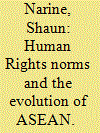| Srl | Item |
| 1 |
ID:
117734


|
|
|
|
|
| Publication |
2012.
|
| Summary/Abstract |
In recent years, ASEAN has implemented numerous organizational reforms that are designed to rejuvenate its institutional structures and international reputation. Among these reforms has been the introduction of the ASEAN Intergovernmental Commission on Human Rights (AICHR). This body is meant to monitor and promote human rights norms and practices among the ASEAN states. It has been criticized, however, as lacking the power to force state compliance. This paper argues that ASEAN's apparent willingness to entertain a more robust institutional human rights regime is properly understood as part of its effort to rehabilitate the organization's international credibility as opposed to an indication of a substantive normative shift in the outlook of key ASEAN members. The paper examines the circumstances around the creation of the AICHR and considers the ongoing state-building problems faced by most ASEAN states. It argues that the AICHR is the product of an inadequate planning process and that the international human rights environment is changing in ways that will relieve the pressure on ASEAN to reform in a manner that reflects the rhetorical preferences of the Western world on the issue of human rights.
|
|
|
|
|
|
|
|
|
|
|
|
|
|
|
|
| 2 |
ID:
110189


|
|
|
|
|
| Publication |
2012.
|
| Summary/Abstract |
While governments in Southeast Asia, together with other countries in the world, have shown their unanimous support toward the RtoP, the implementation of such principle needs more than just states' commitment. Since state actor, in many cases, is the perpetrator of crimes included in RtoP, the role of civil society is indeed crucial to put pressure toward the government to fulfill its responsibility to protect its populations. This article aims to describe Indonesia's position so far in responding to this RtoP principle. It tries not to cover only the government's position, but instead to also delineate the civil society's standpoint, which is an important element particularly, to provide a more comprehensive overview. As based on the latest elaboration of RtoP within the UN Outcome Document (2005) into three strategic pillars, it is interesting to observe whether both sides, the government and civil society are comfortable to recognise all pillars altogether or rather incline to take one or two pillars only. Nevertheless, robust development of civil society in Indonesia, as one of positive implications from process toward democracy has opened ample opportunities for the application of RtoP principle. Local NGOs that particularly focus on human rights issue have demonstrated the ability to put pressure on the government to exercise its responsibility as reflected in te first and second pillars. Since the government has stressed upon the importance of prevention to implement RtoP principle, the involvement of civil society is a must, particularly to carry out the role of early-warning to prevent the outbreak of mass atrocities that fall within the scope of RtoP, which can become another worthy discussion to elaborate. Finally, RtoP is all about implementation. Genuine political will from the government would be needed while partnership with the civil society element is nothing but important.
|
|
|
|
|
|
|
|
|
|
|
|
|
|
|
|